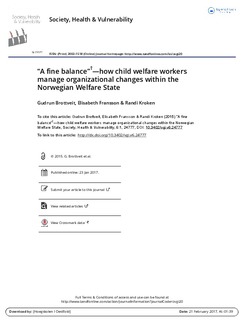| dc.description.abstract | In 2004, the Child Welfare Reform (CWR) was introduced in Norway. One of the most important goals of the reform was to strengthen State level authority in public child welfare and establish equal child welfare services across the country. The aim of this article is to study how this new reform affected the work of municipal child welfare professionals and led to the development of a regional project called New Child Welfare (NCW). Based on qualitative interviews with central actors in NCW, regarding the interaction between state and local child welfare professionals, the article shows how professionals within local child welfare reacted on the CWR. The NCW was established as a consequence of the professionals’ reaction on state governance and represent a new type of network. Inspired by Michel Foucaults’ concepts of governmentality and self-work, the article focuses on the development of the NCW as a result of child welfare workers’ confrontation with state governance and their fight for innovative solutions, knowing that the reform had direct impact on vulnerable children, youths, and their families. The local and collective self-work in NCW is an expression of a new form of productive power based on equality and cooperation, as well as a particular form of dependency between municipal and state levels of governance. The article highlights the importance of studying how reforms introduced by the state actually influence local child welfare work, policy, and professionalism within municipal child welfare. | nb_NO |
